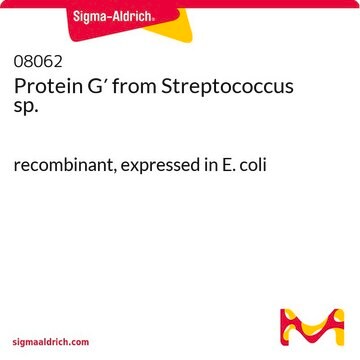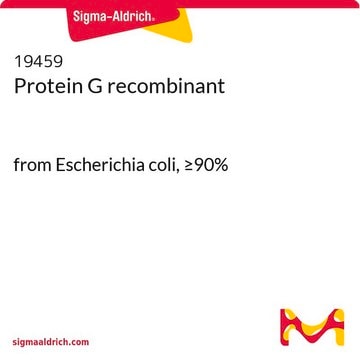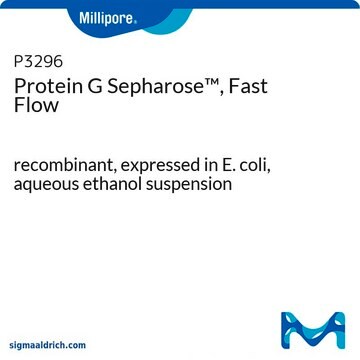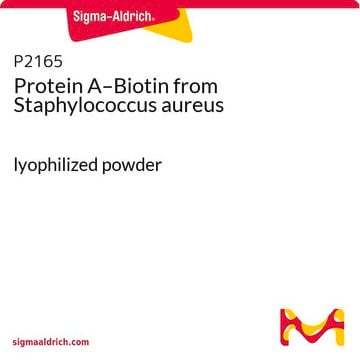P4689
Protein G′ from proprietary source
recombinant, expressed in E. coli, lyophilized powder
Synonym(s):
G′ protein
Sign Into View Organizational & Contract Pricing
All Photos(1)
About This Item
UNSPSC Code:
12352203
NACRES:
NA.46
Recommended Products
recombinant
expressed in E. coli
Quality Level
conjugate
unconjugated
form
lyophilized powder
capacity
~5 mg/mg, solid binding capacity (IgG)
storage temp.
−20°C
General description
Genetically engineered truncated protein G; retains affinity for IgG, but lacks albumin- and Fab- binding sites and membrane-binding regions.
Protein G is a group G Streptococcus protein and is a large multi-domain cell wall protein. It interacts with the Fc region of IgG (immunolglobulin) through its repeating 55-amino acid domain. Strain GX7809 and GX7805 contain two and three such protein repeats respectively.
Application
Protein G has been used for the analysis of mAb (monoclonal antibody) synergy towards hCG (human chorionic gonadotropin) using surface plasmon resonance (SPR), and for serum IgG galactosylation obtained from RA (rheumatoid arthrtitis) patients and MRL-lpr mice.
Biochem/physiol Actions
Protein G is implicated in the evasion of host defence response by Streptococcus, via its protein binding properties. It is interacts with α2-micorglobulin which is a predominant inhibitor of human plasma.
Physical form
Lyophilized from water.
Disclaimer
Unless otherwise stated in our catalog or other company documentation accompanying the product(s), our products are intended for research use only and are not to be used for any other purpose, which includes but is not limited to, unauthorized commercial uses, in vitro diagnostic uses, ex vivo or in vivo therapeutic uses or any type of consumption or application to humans or animals.
Storage Class Code
11 - Combustible Solids
WGK
WGK 3
Flash Point(F)
Not applicable
Flash Point(C)
Not applicable
Personal Protective Equipment
dust mask type N95 (US), Eyeshields, Gloves
Certificates of Analysis (COA)
Search for Certificates of Analysis (COA) by entering the products Lot/Batch Number. Lot and Batch Numbers can be found on a product’s label following the words ‘Lot’ or ‘Batch’.
Already Own This Product?
Find documentation for the products that you have recently purchased in the Document Library.
Customers Also Viewed
Arie Ryvkin et al.
PloS one, 7(8), e41469-e41469 (2012-08-08)
Polyclonal serum consists of vast collections of antibodies, products of differentiated B-cells. The spectrum of antibody specificities is dynamic and varies with age, physiology, and exposure to pathological insults. The complete repertoire of antibody specificities in blood, the IgOme, is
C R Goward et al.
The Biochemical journal, 267(1), 171-177 (1990-04-01)
The gene for Protein G from Streptococcus strain G148 was cloned and expressed in Escherichia coli. The regions on the gene corresponding to the albumin-binding domains and the Fab-binding region were then deleted by site-directed mutagenesis. The translation of regions
Thomas Pausch et al.
Pancreas, 47(5), 561-567 (2018-04-24)
Defensins are antimicrobial peptides playing a role in innate immunity, in epithelial cell regeneration, and in carcinogenesis of inflammation-triggered malignancies. We analyzed this role in pancreatic ductal adenocarcinoma (PDAC) in the context of its association with chronic pancreatitis (CP). Human
Oleksiy Krupin et al.
Sensors (Basel, Switzerland), 19(3) (2019-02-06)
Straight long-range surface plasmon-polariton (LRSPP) waveguides as biosensors for label-free detection are discussed. The sensors consist of 5-μm-wide 35-nm-thick gold stripes embedded in a low-index optical-grade fluoropolymer (CYTOPTM) with fluidic channels etched to the Au surface of the stripes. This
Raj Mutharasan
Methods in molecular biology (Clifton, N.J.), 504, 73-82 (2009-01-23)
In this chapter, method of fabricating a cantilever biosensors and their use in measuring the presence of a protein is described. There are many variations in construction of a cantilever sensor. A simple and an easy version is described in
Our team of scientists has experience in all areas of research including Life Science, Material Science, Chemical Synthesis, Chromatography, Analytical and many others.
Contact Technical Service












